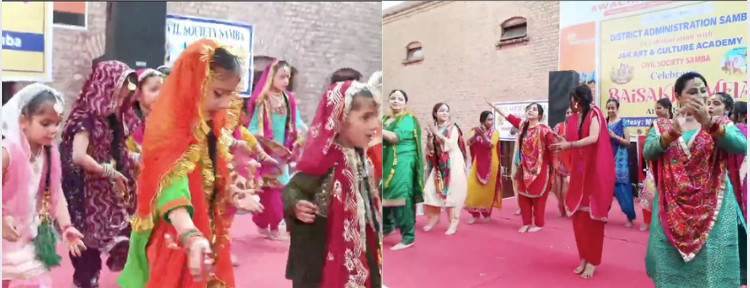SAMBA, April 13, 2025 – The historic Samba Fort came alive with the spirit of Baisakhi Mela, a grand celebration of Punjabi culture and harvest festival traditions, organized by the District Administration Samba in collaboration with the J&K Academy of Art, Culture and Languages and Civil Society Samba. The event, held on Sunday, showcased dazzling cultural performances while delivering a powerful message of fostering a drug-free and clean Samba.
The Baisakhi Mela drew thousands of locals and visitors who immersed themselves in the vibrant festivities. The fort’s courtyard resonated with the energetic beats of dhol and the rhythmic grace of Bhangra and Gidda, traditional Punjabi folk dances performed by local artists and youth groups. Folk music performances, including soulful renditions of Punjabi boliyan and tappe, captivated the audience, celebrating the region’s rich cultural heritage. Stalls adorned with Phulkari embroidery, handicrafts, and Punjabi cuisine—from sarson da saag to jalebi—added to the festive charm, reflecting the essence of community unity.
A key highlight of the mela was its focus on social awareness. Performances and speeches emphasized the importance of a drug-free society, with artists and organizers urging the youth to steer clear of substance abuse and embrace healthy lifestyles. “This Baisakhi, let’s pledge for a clean and drug-free Samba, where our traditions thrive in a safe environment,” said a district official, reinforcing the event’s anti-drug campaign. Banners and skits promoting environmental cleanliness also underscored the vision of a sustainable Samba, encouraging collective responsibility.
The event featured interactive activities like turban-tying competitions and traditional games, engaging families and children in the joyous celebration. Langar stalls served free meals, embodying the Sikh values of selfless service and equality. The mela also paid tribute to the historical significance of Baisakhi, commemorating the formation of the Khalsa Panth by Guru Gobind Singh Ji in 1699 and marking the harvest season with gratitude.
Organisers ensured robust arrangements, including security and sanitation, to facilitate a smooth experience. The Samba Fort, a symbol of the region’s Dogra heritage, provided a fitting backdrop, blending history with contemporary aspirations for a healthier society. The event concluded with a renewed commitment to preserving cultural traditions while advocating for social reform.



